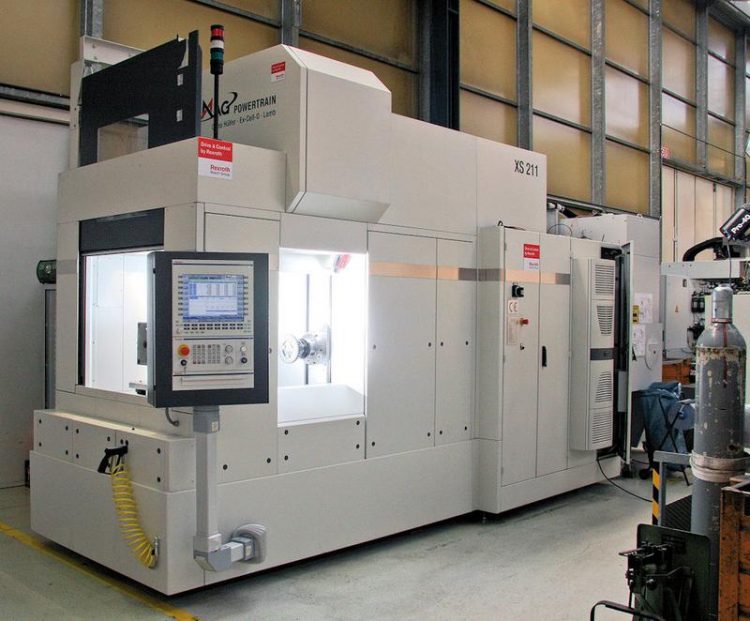Increasing the efficiency of metal-cutting machining centres

4-axis machining centre MAG XS-211 (© TU Darmstadt).
Modern machine tools offer a diverse range of possibilities: they drill, mill, saw, turn and grind fully automatically. These production steps, which comprise the different metal-cutting processes, often only make up around 20% of the machine’s energy consumption.
Most of the energy is consumed by peripheral systems such as the hydraulics, cooling and lubrication. The BINE-Projektinfo brochure “Making machine tools work more efficiently” (03/2014) presents a research project that analysed the energy consumption of the individual machine components and developed optimisation concepts.
Energy savings of up to 50% are possible. In some cases the additional measures pay for themselves after just a few months.
The most energy intensive components in machine tools are the cooling lubricant systems, machine cooling and hydraulics. These formed the focus of the research work. For the investigations, a 4-axis machining centre was used similar to those deployed in the automotive industry, and which was re-equipped for research purposes.
This has resulted in a diverse range of optimisation concepts for individual components. As part of the project, a software tool has also been developed that compares various configurations for machine tools and supplies analyses of the energy consumption and costs at an early stage.
The research project is being led by the Institute for Production Management, Technology and Machine Tools (PTW) at TU Darmstadt. Partner companies are also involved from the mechanical engineering, component manufacturing and automotive production fields.
The BINE-projectinfobrochure, which can be obtained free of charge from the BINE Information Service at FIZ Karlsruhe, is available online at www.bine.info or by calling +49 (0)228 92379-0.
Press contact
Uwe Milles
presse(at)bine.info
About BINE Information Service
Energy research for practical applications
The BINE Information Service reports on energy research topics, such as new materials, systems and components, as well as innovative concepts and methods. The knowledge gained is incorporated into the implementation of new technologies in practice, because first-rate information provides a basis for pioneering decisions, whether in the planning of energy-optimised buildings, increasing the efficiency of industrial processes, or integrating renewable energy sources into existing systems.
About FIZ Karlsruhe
FIZ Karlsruhe – Leibniz Institute for Information Infrastructure is a not-for-profit organization with the public mission to make sci-tech information from all over the world publicly available and to provide related services in order to support the national and international transfer of knowledge and the promotion of innovation.
Our business areas:
• STN International – the world’s leading online service for research and patent information in science and technology
• KnowEsis – innovative eScience solutions to support the process of research in all its stages, and throughout all scientific disciplines
• Databases and Information Services – Databases and science portals in mathematics, computer science, crystallography, chemistry, and energy technology
FIZ Karlsruhe is a member of the Leibniz Association (WGL) which consists of 87 German research and infrastructure institutions.
http://www.bine.info/en/press/press-releases/press/pressemitteilung/effizienz-sp… – Download cover, press release and info-pdf
http://www.bine.info/en – BINE Informationsdienst english
Media Contact
All latest news from the category: Machine Engineering
Machine engineering is one of Germany’s key industries. The importance of this segment has led to the creation of new university degree programs in fields such as production and logistics, process engineering, vehicle/automotive engineering, production engineering and aerospace engineering among others.
innovations-report offers informative reports and articles covering technologies such as automation, motion, power train, energy, conveyor, plastics, lightweight construction, logistics/warehousing, measurement systems, machine tools and control engineering.
Newest articles

NASA: Mystery of life’s handedness deepens
The mystery of why life uses molecules with specific orientations has deepened with a NASA-funded discovery that RNA — a key molecule thought to have potentially held the instructions for…

What are the effects of historic lithium mining on water quality?
Study reveals low levels of common contaminants but high levels of other elements in waters associated with an abandoned lithium mine. Lithium ore and mining waste from a historic lithium…

Quantum-inspired design boosts efficiency of heat-to-electricity conversion
Rice engineers take unconventional route to improving thermophotovoltaic systems. Researchers at Rice University have found a new way to improve a key element of thermophotovoltaic (TPV) systems, which convert heat…



